Carrots! A humble vegetable that holds a special place in kitchens around the world. Whether you're a seasoned chef or a cooking novice, chances are you've cooked carrots at some point. But let's be honest, getting them just right can be a bit of a challenge. Too long in the pan and they turn into mushy, flavorless blobs. Too short, and they remain stubbornly crunchy. No one wants that, do they?
Well, fear not, fellow carrot enthusiasts! After years of trial and error (and yes, I've had my fair share of disastrously mushy carrots), I've finally cracked the code to consistently perfect carrots. This guide is your one-stop shop for all things carrot, from choosing the right ones to the best cooking methods, with detailed timings and tips for every scenario. So, grab your chopping board, a fresh bunch of carrots, and let's embark on this delicious journey together!
(Part 1) Choosing the Perfect Carrot
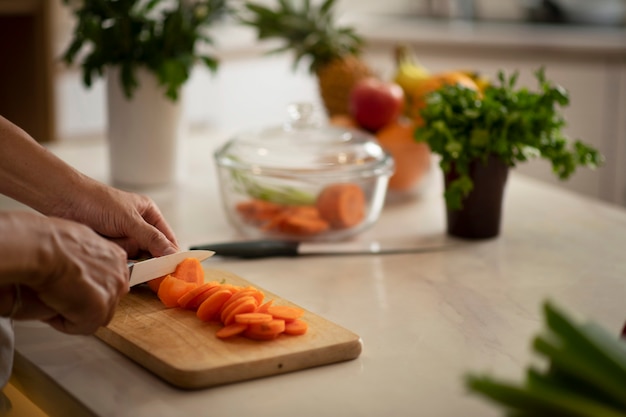
The first step to achieving carrot nirvana is selecting the right ingredients. It's like baking a cake – you wouldn't start with stale flour, would you? So, why settle for lackluster carrots?
The Look
When you're at the supermarket, take a moment to give your potential carrots a good look. You're searching for vibrant orange hues, like the sun peeking through autumn leaves. They should be firm to the touch, with no blemishes or soft spots. If the tops are still attached, check for a fresh, vibrant green. You're looking for those carrots that scream "deliciousness" with their vibrant color and firm texture!
The Size
The size of your carrots matters too. Smaller carrots, often called baby carrots, are perfect for roasting or stir-fries because they cook faster. Larger carrots are ideal for chopping into chunks for soups, stews, or gratins, where you want them to hold their shape and contribute their flavor to the dish.
Beyond the Basics: Different Varieties
You might be surprised to learn that there's more to carrots than just the classic orange variety. Let's explore some of the interesting options:
- Imperator: This is the classic, long, orange carrot that's commonly found in supermarkets. It has a sweet flavour and is versatile for cooking.
- Baby Carrots: These are small, peeled carrots that are perfect for snacking or adding to salads.
- Purple Carrots: These carrots are known for their vibrant purple colour and slightly earthy flavour. They're great for adding colour and a unique flavour to dishes.
- Yellow Carrots: These carrots have a milder flavour and a slightly sweet taste. They're great for roasting or adding to salads.
Experiment with different varieties to discover your favorites and add a dash of color and excitement to your meals.
(Part 2) Getting Ready to Cook: The Prep Work
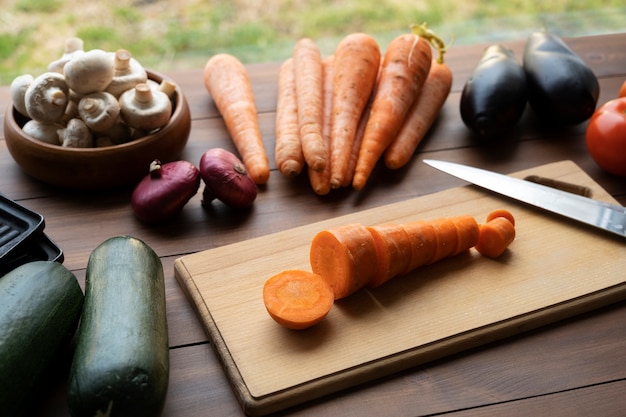
You've chosen your perfect carrots, now it's time to get them ready for the cooking stage. A few simple steps can make all the difference in the final result.
Wash and Scrub
Carrots, even the ones that look pristine, are often coated in a thin layer of dirt. It's essential to give them a good wash before you start cooking. I usually scrub them under running water with a vegetable brush, making sure to get into any crevices. If you're using baby carrots, a quick rinse is usually enough.
Peel or Not?
This is a matter of personal preference. Some people prefer to peel their carrots, while others leave the skin on for extra flavour and nutrients. The skin contains fiber and antioxidants, so don't feel pressured to peel if you don't want to. If you're peeling, use a vegetable peeler and be careful not to remove too much of the carrot. If you're keeping the skin on, scrub them well to remove any dirt.
Chop and Dice
Now, it's time for the chopping board! How you chop your carrots depends on the recipe. For roasting, I prefer to cut them into chunky pieces. For soups and stews, I dice them into smaller cubes. If you're making carrot sticks for snacking, you'll want to chop them into long, thin sticks.
(Part 3) Boiling Carrots: The Basics
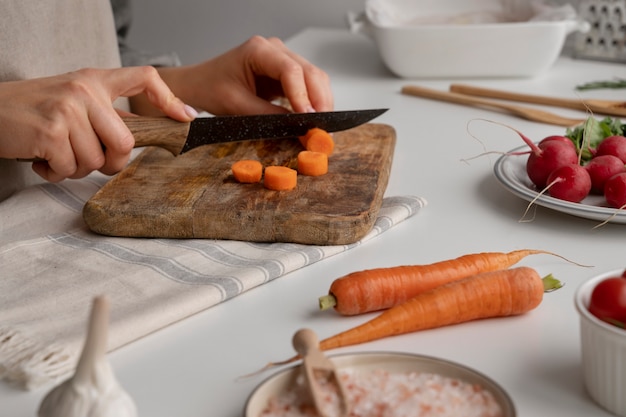
Boiling is a classic way to cook carrots and a good starting point for understanding how to cook them properly.
Time and Temperature
Boiling carrots is fairly straightforward. Bring a large pot of salted water to a rolling boil, then add your chopped carrots. Cook them until tender, but not mushy. This usually takes 10-15 minutes for chopped carrots, but smaller carrots will cook faster. You can test for doneness by piercing them with a fork; they should be tender but still hold their shape.
Adding Flavor
Don't be afraid to add flavor to your boiling water. A bay leaf, a sprig of thyme, or a pinch of cumin can add depth and complexity to your carrots. Experiment with different herbs and spices to find what you like best!
Cooling and Storing
Once your carrots are cooked, drain them in a colander and rinse with cold water to stop the cooking process. This will help preserve their vibrant color and prevent them from overcooking. You can then store them in the fridge for up to 3 days, ready to add to salads, soups, or whatever your heart desires.
(Part 4) Roasting Carrots: Sweet and Savory Delights
Roasting carrots brings out their natural sweetness and adds a delightful caramelized flavour. I love roasting carrots, they always turn out wonderfully delicious.
Pre-Roast Prep
Preheat your oven to 200°C (400°F) and line a baking sheet with parchment paper. This will prevent sticking and make cleanup a breeze. Toss your chopped carrots with olive oil, salt, pepper, and any other herbs or spices you like. I love adding a pinch of rosemary or thyme for a touch of earthy aroma. If you want a bit of sweetness, add a tablespoon of honey or maple syrup.
roasting time
Spread the carrots in a single layer on the baking sheet, ensuring they have space to breathe. Roast for 20-25 minutes, or until they are tender and slightly caramelized. If you want them extra crispy, roast for a few more minutes.
Variations
Roasting offers endless possibilities for flavor and creativity! You can roast carrots with other vegetables like onions, potatoes, or sweet potatoes. Or, add a squeeze of lemon juice or balsamic vinegar for a tangy twist. You can even add a sprinkle of grated Parmesan cheese towards the end of cooking for a cheesy topping. Get creative and explore different flavor combinations.
(Part 5) Steaming Carrots: Gentle and Nutritious
Steaming carrots is a gentle cooking method that preserves their nutrients and flavour. It's a good option if you're looking for a healthy and quick way to cook carrots.
Steaming Essentials
You'll need a steamer basket that fits snugly over a pot of boiling water. Place your chopped carrots in the steamer basket, making sure they aren't overcrowded. This will ensure even cooking. Cover the pot and steam the carrots for 8-10 minutes, or until tender.
Tips and Tricks
You can add aromatics to the water to flavour the steam. Lemon slices, a sprig of rosemary, or a bay leaf are all great options. Don't forget to season the carrots with salt and pepper after steaming for a burst of flavor.
(Part 6) Sautéing Carrots: Quick and Flavorful
Sautéing is a great way to cook carrots if you're short on time. It's quick and easy, and the carrots retain their bright colour and crunchy texture.
Sautéing Basics
Heat a tablespoon of olive oil in a large skillet over medium heat. Add your chopped carrots and sauté for 5-7 minutes, or until they are tender-crisp. Season with salt and pepper, and add any other spices or herbs you like. I often add a pinch of ginger for a bit of zing.
Adding Flavor
Sautéing carrots is a great opportunity to get creative with flavours. You can add garlic, onions, or chillies to the pan for a more complex flavour profile. You can even deglaze the pan with a splash of wine or broth after cooking the carrots for a delicious sauce.
(Part 7) Carrot Mash: Creamy and Delicious
Carrot mash is a delightful and surprisingly versatile dish. It's creamy, delicious, and a great way to use up leftover cooked carrots.
Simple Mash
Boil your carrots until tender, then drain them and mash them with a fork or potato masher. You can add a little butter, olive oil, or milk to make the mash smoother and creamier. Season with salt, pepper, and a pinch of nutmeg for extra flavour.
Adding Flavor
Carrot mash is a blank canvas for flavour. You can add chopped herbs like parsley, dill, or chives, spices like cumin or curry powder, or even a dollop of sour cream or crème fraiche. I love adding a pinch of cayenne pepper for a bit of heat.
(Part 8) Carrots in Soups and Stews: Warmth and Comfort
Carrots are a staple in many soups and stews, adding sweetness and depth of flavour. Their vibrant orange colour also makes them visually appealing.
Adding Carrots to Soups
Chop your carrots into small cubes and add them to your favourite soup recipe. They can be added at the beginning of cooking for a deeper flavour or towards the end for a brighter taste.
Tips for Soups
For a thicker soup, blend some of the cooked carrots in with a hand blender. If you're making a creamy soup, add a splash of cream or milk at the end.
(Part 9) The Ultimate Carrot Bake: A Family Favourite
This is a recipe I've made countless times and it's always a hit with the family. It's easy, delicious, and perfect for a cozy evening meal.
Ingredients:
- 1 kg carrots, peeled and chopped
- 2 tbsp olive oil
- 1 onion, chopped
- 2 cloves garlic, minced
- 1 tsp thyme
- 500 ml vegetable stock
- 200g grated cheddar cheese
- Salt and pepper to taste
Instructions:
Preheat your oven to 180°C (350°F).
Heat the olive oil in a large pan over medium heat. Add the onion and garlic and cook until softened. This will add a delicious base for your carrot bake.
Add the chopped carrots, thyme, and vegetable stock. Bring to a simmer and cook for 15 minutes, or until the carrots are almost tender.
Pour the mixture into a baking dish and sprinkle with grated cheese. Bake for 20 minutes, or until the cheese is melted and golden brown. The cheese will melt beautifully and create a crispy, golden top.
Serve warm and enjoy! This comforting and flavorful dish is sure to please everyone at the table.
(Part 10) Cooking Carrots for Different Dietary Needs
Whether you're vegan, vegetarian, or following a specific diet, there are always ways to cook carrots to fit your needs.
Vegan and Vegetarian
Carrots themselves are vegan and vegetarian-friendly. Just ensure the other ingredients in your recipes are also suitable for your dietary needs. For example, if you're making a carrot soup, use vegetable stock instead of chicken or beef stock.
Gluten-Free
Carrots are naturally gluten-free, so they are perfect for those following a gluten-free diet. Just double-check that any sauces or seasonings you use are also gluten-free.
Dairy-Free
Carrots are dairy-free, so you can enjoy them in many recipes without worrying about dairy. If you're using a recipe that calls for dairy, you can easily substitute it with dairy-free alternatives like almond milk, coconut milk, or dairy-free cheese.
(Part 11) FAQs: Your Carrot Questions Answered
1. Can I cook carrots in a microwave?
Yes, you can cook carrots in the microwave. Cut them into thin slices or wedges and place them in a microwave-safe dish with a few tablespoons of water. Microwave on high for 3-5 minutes, or until tender. This is a quick and convenient option when you're short on time.
2. How can I prevent carrots from getting mushy?
To prevent carrots from getting mushy, don't overcook them. Test them with a fork to see if they are tender but still hold their shape. You can also cook them in less water or use a method that won't break them down, like steaming or roasting.
3. What are some creative ways to use carrots?
Carrots are incredibly versatile! You can use them in sweet and savory dishes, like carrot cake, carrot soup, or carrot and coriander soup. You can also add them to salads, stir-fries, or use them to make carrot sticks for snacking. Get creative and explore the possibilities!
4. Can I freeze cooked carrots?
Yes, you can freeze cooked carrots. Cool them completely after cooking, then place them in a freezer bag or container. Frozen carrots can last for up to 6 months. This is a great way to save time and have cooked carrots ready to go for future meals.
5. What are the health benefits of carrots?
Carrots are packed with vitamins, minerals, and antioxidants. They're a good source of vitamin A, which is important for healthy eyesight and skin. They also contain vitamin K, potassium, and fiber. Eating carrots regularly can help improve digestion, boost immunity, and reduce the risk of certain cancers.
So, there you have it – your ultimate guide to cooking carrots. I hope you've found it helpful and inspiring. Remember, the key to perfect carrots is choosing the right ones, prepping them properly, and using the right cooking method. So go forth and experiment! Happy cooking!
Everyone is watching

How to Cook Frozen Lobster Tails Perfectly: A Step-by-Step Guide
RecipesLobster. Just the word conjures up images of lavish meals, special occasions, and a taste of luxury. But let's...

Pigs in a Blanket Cooking Time: How Long to Bake for Perfect Results
RecipesAh, pigs in a blanket. Just the name conjures up images of those delightful little parcels of crispy pastry en...

Pork Fillet Cooking Time: How Long to Cook It Perfectly
RecipesPork fillet, or tenderloin as it's sometimes called, is a real favourite in our house. It's so versatile, and...
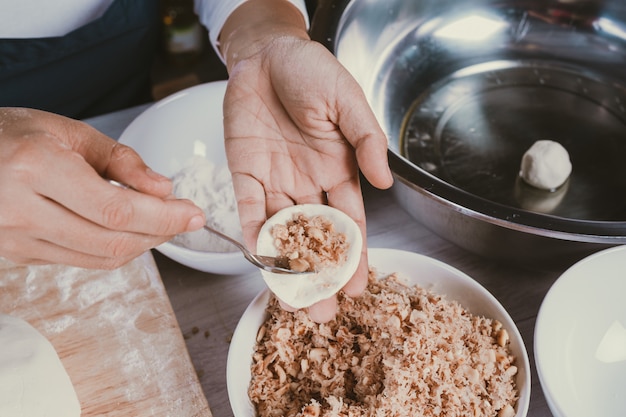
The Ultimate Guide to Tender, Juicy Pulled Pork
RecipesRight, let's talk pulled pork. It's one of those dishes that just screams "comfort food," doesn't it? I mean...
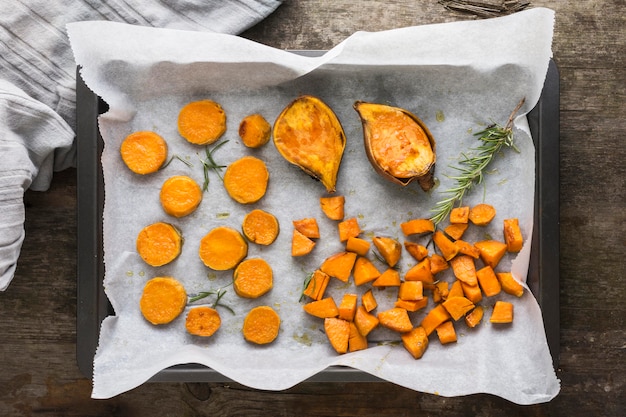
The Ultimate Guide to Cooking Sweet Potatoes: From Roasting to Mashing
RecipesSweet potatoes. Just the name conjures up images of warm, comforting dishes, bursts of vibrant color, and a to...
